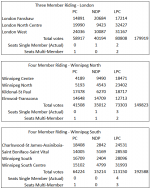Why stop at just one MP per riding?
Andrew Coyne
National Post
08 Jul 2016
At bottom, the debate over electoral reform boils down to this: should each riding be represented by one member of Parliament, or several?
That’s the fundamental difference between electoral systems. Single-member systems like first past the post or preferential voting may differ in how you mark your ballot — with a single x, or a 1, 2, 3 — but they are alike in being “winner take all” systems, where all of the voters in a riding are represented by a lone MP.
What distinguishes proportional systems is the division of representation in an each electoral district among several members. Suppose a riding had five members. Instead of 40 per cent of the vote entitling a party to 100 per cent of the representation, as at present, it would be good enough for two of the five, with the rest distributed among the other parties in like manner. The system is proportional in the whole because it is proportional in the parts.
But whether single- or multi-member, what is true in either case is that members are elected in distinct electoral districts. There is zero likelihood, in a country the size of Canada, of anyone proposing a purely proportional system with all of its members elected at large, as in Israel or the Netherlands.
Rather, members might be elected from ridings with five to seven members, as in the single transferable vote (STV) proposed for British Columbia some years back, with a sprinkling of single members where multi-member ridings would be impractically large. Or they could be elected mostly from single-member ridings, topped up with MPs elected from larger regional districts of 20 or so members, as in the mixed-member proportional (MMP) system proposed in 2004 by the Law Commission of Canada.
So while we talk of systems as being proportional or not in terms of the parliaments that result, the question in practical terms is whether members are elected from single- or multi-member electoral districts. I stress this point because so much of the early debate, with the special committee on electoral reform now under way, seems to overlook this distinction. The result is mutual incomprehension, circular arguments, and talking past each other.
When proportional representation advocates complain that the allocation of seats among the parties in the legislature does not resemble their relative shares of the votes cast — with the especially unhappy effect of allowing a minority of the voters to rule over the majority — first past the post’s defenders reply: why should it? Members were elected in 338 separate riding elections, not in a single nationwide vote.
When reformers point out the imbalance this creates between voters — in a given election it typically takes many more votes to elect a member from one party than another — first-past-the-posters look positively mystified: everyone gets one ballot. And when the former observe that under first past the post the votes cast for anyone but the leading candidate in a riding are “wasted,” in the sense that they do not contribute to electing anyone, the latter lose all patience. How could any of the votes have been wasted, they ask, if all were counted? The candidate who was elected may not have been everyone’s choice, but he still represents everyone.
To reformers’ complaints about how the system works, in other words, the answer commonly offered is: that’s how the system works. It is as if that were not just the system we have now, but the only system there is. And of course if you assume that then yes, reformers’ objections become literally incomprehensible. They might as well object to the weather. If only one member can be elected per riding, then obviously it’s silly to talk about wasted votes, or to complain that voters who supported another candidate are not represented. That’s life. Suck it up. The resulting parliament was not proportional? That’s not how our system works.
Isn’t it? Is the essence of our system that members are elected in single-member ridings? Or is it simply that they are elected in … ridings? If more than one MP can represent a riding, then the imagined contradiction between proportionality and “our system” disappears. If proportionality could only be achieved at the expense of local representation, that would be one thing. But if all it means is a switch from single- to multi-member ridings, well, what’s so special about the number one? What exactly is wrong with giving representation, not just to supporters of the largest party, but the rest of a riding’s voters as well?
At any rate, it’s worth debating. Some might argue that single-member ridings give constituents a clearer sense of who to take their problems to, and who to hold to account. Others might reply that, with several members competing to represent them, constituents might get better service: if one didn’t answer your letter, another might.
Of course, there are larger implications to such a switch, knock-on effects — in the number of parties in Parliament, and their ideological and geographic bases; in how governments are formed, how parties campaign, and how voters choose; in how politics is conducted between elections, and so on. These, too, are worth debating.
But we cannot have a debate about alternatives until we have fully absorbed the idea that in fact alternatives are possible. “We cannot change the system we have now because that would be a change from the system we have now” is not a particularly useful starting point.




